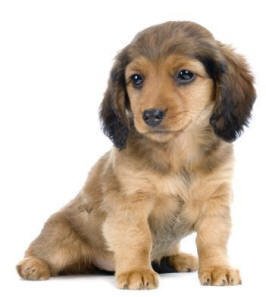Thank you for your interest in the Miniature Dachshund, a diminutive yet daring breed known for its distinctive shape and vibrant personality. This guide provides a comprehensive overview of the breed, perfect for pet lovers considering this unique dog as a companion.
Breed Facts
- Country of Origin: Germany
- Breed Group: Hound
- Size: Small
- Height: 5-6 inches at the shoulder
- Weight: Under 11 pounds
- Lifespan: 12-16 years
- Average Price: $500-$1500
- Hypoallergenic: No
- Shedding: Moderate, not hypoallergenic
- Good With Kids: Yes, but best with older children due to their small size and delicate backs
Miniature Dachshund History
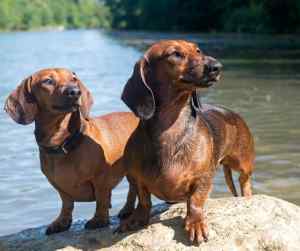 The Miniature Dachshund, originally bred in Germany to hunt small animals like rabbits and foxes, is a smaller version of the standard Dachshund. Their history dates back to the 15th century, but they gained popularity in the 19th century when hunters needed smaller dogs to go down holes to track game.
The Miniature Dachshund, originally bred in Germany to hunt small animals like rabbits and foxes, is a smaller version of the standard Dachshund. Their history dates back to the 15th century, but they gained popularity in the 19th century when hunters needed smaller dogs to go down holes to track game.
This breed was meticulously bred for its size to excel in this task, resulting in the Miniature Dachshund we know today.
Personality
Miniature Dachshunds are bold and lively, often described as endlessly curious and always up for adventure. They possess a surprising amount of stamina and spirit for their size. Known for their bravery and determination, they can also be stubborn, requiring a firm but loving hand in training. Their personality makes them excellent companions for those who appreciate a dog with a mind of its own.
Appearance
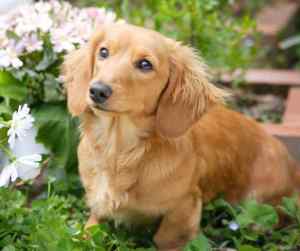 The Miniature Dachshund is notable for its elongated body and short legs, a form that has earned them the affectionate nickname “wiener dog.” They come in three coat types: smooth, long-haired, and wire-haired. Colors can range widely from solids like reds to dappled, sable, and brindle. Their expressive eyes and long ears add to their distinctive and endearing appearance.
The Miniature Dachshund is notable for its elongated body and short legs, a form that has earned them the affectionate nickname “wiener dog.” They come in three coat types: smooth, long-haired, and wire-haired. Colors can range widely from solids like reds to dappled, sable, and brindle. Their expressive eyes and long ears add to their distinctive and endearing appearance.
Miniature Dachshund Health Concerns
Miniature Dachshunds generally enjoy good health, but their unique physique can lead to specific issues, primarily spinal problems such as Intervertebral Disc Disease (IVDD). Owners should avoid activities that can strain their backs and ensure these dogs maintain a healthy weight to mitigate potential health risks.
Other concerns include dental issues due to their small mouths, and they can be prone to obesity without proper diet and exercise.
Exercise Needs
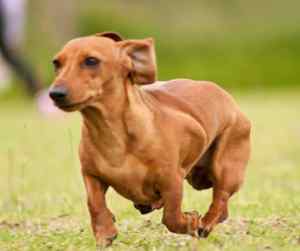 Despite their small size, Miniature Dachshunds have a good amount of energy and require regular exercise to stay healthy and happy.
Despite their small size, Miniature Dachshunds have a good amount of energy and require regular exercise to stay healthy and happy.
Daily walks and play sessions are necessary, but their activities should be monitored to avoid overexertion, which can harm their delicate backs. Interactive play that stimulates their mind and body is ideal for this intelligent breed.
Training and Behavior
Training a Miniature Dachshund can be challenging due to their stubborn streak, but with consistency and patience, they can be very well-behaved pets. Early socialization and puppy training classes are recommended. They respond best to positive reinforcement techniques such as treats and praises. Despite their size, they make excellent watchdogs, often alert and suspicious of strangers.
Grooming Needs
The grooming needs of a Miniature Dachshund vary with their coat type. Smooth-coated require minimal grooming, while long-haired and wire-haired types need regular brushing to prevent matting and reduce shedding. All Miniature Dachshunds should have their nails trimmed regularly and their ears checked to prevent infections.
Care Needs
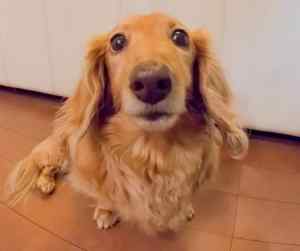 Miniature Dachshunds thrive on human companionship and do not like being left alone for long periods. Their diet should be carefully managed to prevent obesity, a common problem in the breed. Due to their long spine, sleeping arrangements should support their back, with ramps or steps available to higher areas to prevent jumping and subsequent injuries.
Miniature Dachshunds thrive on human companionship and do not like being left alone for long periods. Their diet should be carefully managed to prevent obesity, a common problem in the breed. Due to their long spine, sleeping arrangements should support their back, with ramps or steps available to higher areas to prevent jumping and subsequent injuries.
5 Frequently Asked Questions
- Are Miniature Dachshunds good for apartments? Yes, they are excellent for apartment living due to their size, but they still need regular exercise and stimulation.
- Do Miniature Dachshunds bark a lot? They can be quite vocal, especially when alerting their family to the presence of strangers or when left alone.
- How often should I feed my Miniature Dachshund? Typically, feeding a high-quality dog food twice a day is recommended, but this can vary based on the dog’s age, size, and activity level.
- Are Miniature Dachshunds easy to train? They can be stubborn, making training a challenge, but with consistent, positive methods, they can learn quickly.
- Can Miniature Dachshunds live with other pets? Yes, they generally do well with other dogs and can coexist with cats, especially if raised together.
Is the Miniature Dachshund the Right Breed for You?
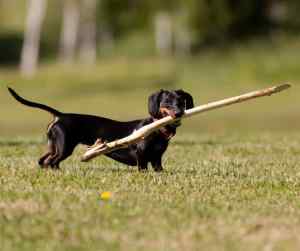 If you’re looking for a small dog with a big personality, the Miniature Dachshund might be the perfect fit. Their size makes them suitable for smaller homes, though potential owners should be prepared for a dog that is emotionally dependent and physically delicate. Their care needs and potential health issues should be seriously considered.
If you’re looking for a small dog with a big personality, the Miniature Dachshund might be the perfect fit. Their size makes them suitable for smaller homes, though potential owners should be prepared for a dog that is emotionally dependent and physically delicate. Their care needs and potential health issues should be seriously considered.
Further Reading
- American Kennel Club – Miniature Dachshund
- This page provides detailed information about the breed’s standards, care tips, and more.
- Dachshund Club of America
- A resource for breed-specific information, events, and advice on finding reputable breeders.
- Your Purebred Puppy – Miniature Dachshund
- Offers reviews, pros and cons, and advice on whether a Miniature Dachshund would suit your home and lifestyle.
Be sure to check out the many additional breed profiles listed on our Small Dog Breeds A to Z home page. Whether you decide to welcome a Miniature Dachshund into your life or are just curious, this guide aims to provide everything you need to know about this endearing breed.

